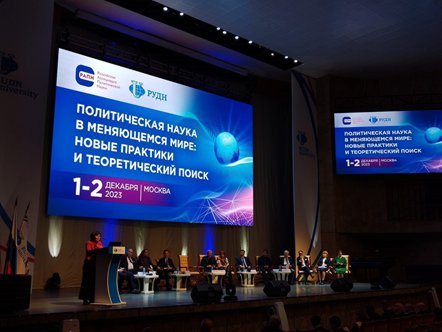600 political scientists from 25 countries define a new system of world order at the conference of the Russian Association of Political Science at RUDN University

Among the key topics of the conference are forecasts of world politics, modern security threats and understanding the evolution of the world order.
“Every word in the topic of the conference has a certain meaning. The key concepts are the changing world and theoretical search. People easily navigate the changing world, but understand it poorly. Understanding today’s highly complex society is impossible without intellectual search. Although we live in an age, when the world is significantly fragmented, traditional, modern and post-modern societies still coexist. Many regions have grown in importance from modest territorial associations to notable subjects of world politics, the Global East and Global South being of special interest. Now, in the era of global challenges and threats, it is not enough to be just a subject with political will, but also understand the world political system.
Our conference is intended to be a think-tank to help find a common understanding of this system throughout the world, and for this purpose our platform has brought together leading political scientists from 25 countries,” Oksana Gaman-Golutvina, President of the Russian Political Science Association.
The geography of the conference is represented by participants from 50 regions of Russia and 25 countries, including: Venezuela, Vietnam, Egypt, India, Iran, Yemen, Cameroon, China, Syria, Turkey, Finland, Chad and Sweden.
Leading Russian and foreign experts in the field of domestic and international politics at the plenary session:
- Tarja Cronberg (Republic of Finland) — professor at the University of Helsinki, Director of the Copenhagen Institute for Peace Studies, ex-member of the European Parliament, ex-minister of the Finnish government;
- Rumel Dahiya (Republic of India) — Brigadier General, Member of the Council of the Institute of United Civil Services of India;
- Fei Haiting (People’s Republic of China) — professor at the Peking University research center;
- Afsar Rathor (Republic of Austria — Pakistan) — member of the Council of the Vienna International Institute for Middle East Studies, former head of the United Nations Department.
The conference will last 2 days, the program including more than 70 panel sessions, sections, round tables and meetings of RPSA research committees.
Major topics:
- sociocultural diversity in the modern world and development policy;
- world political order: theoretical models and political reality;
- modern state: macrostabilization and development;
- strategic goal setting and images of the future civilizations;
- effective technologies of modern communications and modern political discourse development;
- inclusive development, economic growth and well-being;
- fighting poverty and inequality through development;
- political institutions and regimes as social development tools;
- new digital revolution and problems of state governability;
- effective strategies for the development and economic growth of Russia;
- challenges and prospects for Russia’s global positioning etc.
Some of the events will take place at MGIMO, co-organizer of the conference.
More information — on the website.
*Annual All-Russian Conference of RPSA with international participation “Political Science in a Changing World: New Practices and Theoretical Search”.
Sergey Ivanov, a scientist from St. Petersburg, became the first winner of the RUDN University International Prize for scientific achievements and merits in the field of mathematics in the amount of 5 million rubles.
Egyptian scientist Abdelraouf Masoud Ali, associate professor at the Department of Environmental Management, Institute of Environmental Engineering, has been awarded the 2024 Egyptian State Incentive Prize in Agricultural Sciences.
Inventors from 26 countries and 35 regions of Russia presented more than 500 projects at the XVIII Moscow International Salon of Inventions and Innovative Technologies “Archimedes”. 340 projects belong to Russian participants, and their foreign colleagues — 215. RUDN University initiatives were awarded two gold medals.
Sergey Ivanov, a scientist from St. Petersburg, became the first winner of the RUDN University International Prize for scientific achievements and merits in the field of mathematics in the amount of 5 million rubles.
Egyptian scientist Abdelraouf Masoud Ali, associate professor at the Department of Environmental Management, Institute of Environmental Engineering, has been awarded the 2024 Egyptian State Incentive Prize in Agricultural Sciences.
Inventors from 26 countries and 35 regions of Russia presented more than 500 projects at the XVIII Moscow International Salon of Inventions and Innovative Technologies “Archimedes”. 340 projects belong to Russian participants, and their foreign colleagues — 215. RUDN University initiatives were awarded two gold medals.